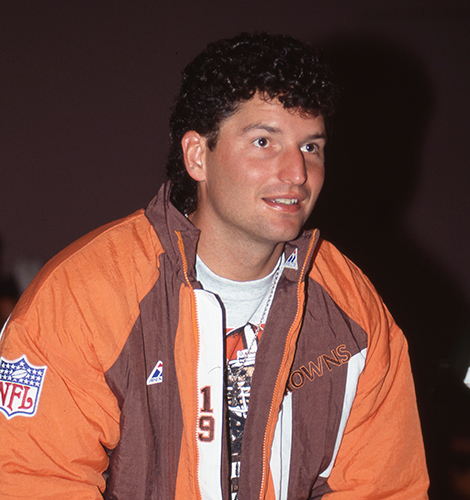Editor’s Note: This is the first of two Cleveland Magazine stories about Bernie Kosar’s health challenges. Next week’s feature story, part of August’s “Best Doctors” issue, details his history of medical obstacles, which began during his time in the NFL, and the natural and traditional treatments he’s using to combat them.
Bernie Kosar, former Browns quarterback and Cleveland sports icon, is in the fight of his life — on two fronts. Kosar, 60, is suffering from liver failure and has Parkinson’s disease.
Kosar was placed on the liver transplant list in late spring. Dr. Anthony Post, a hepatologist for University Hospitals, has been treating him. While Kosar’s condition seemed more dire at the beginning of 2024, Post says he has rapidly improved. The doctor stresses that things can change quickly with liver disease.
“Liver disease does tend to fluctuate,” says Post. “So he’s on that wave thing where it goes up and down. He’s in a good phase right now, but anything bad could happen.”
One of his doctors — Dr. Michael Roizen, chief wellness officer of Cleveland Clinic — says there is more than a 90% chance that Kosar will need a new liver. Post agrees he’ll likely need the surgery eventually.
“He is a wonderful and tough human being,’’ Roizen says, “but undergoing a transplant, no matter who you are, is a difficult thing: difficult to get the transplant, difficult to live with it.’’
The Youngstown native says he was also diagnosed with Parkinson’s, a neurodegenerative disorder of the brain, by an independent NFL doctor in mid-February. Cleveland Magazine was unable to independently confirm that diagnosis.
Kosar, who spoke recently from the backyard of his hoped-for wellness store in Chagrin Falls and several days later by phone, says he had been dogged for years by health issues tied to the liver, but unsure of the source, he brushed them off. The football player in him simply ground through whatever pain existed. Not until a diagnosis of cirrhosis — the third of four stages of liver failure — about 16 months ago did the specificity and severity begin to crystallize.
On Dec. 28, the Browns hosted the New York Jets on Thursday Night Football. Kosar attended but only in mind and spirit.
“My body gave out on me,’’ he says. “I really felt like I wasn’t going to make it home from the Jets game. I sucked it up, though, and continued to avoid the doctors until the new year. Then I went into the hospital and got a massive blood transfusion. It was like: ‘How are you alive? How are you moving? Because your hemoglobin levels are so low.’’’
Doctors told Kosar in January that he likely needed a new liver. While trying to navigate that reality, Kosar again became seriously ill — this time, as he was heading to Super Bowl LVIII in Las Vegas. Kosar, on business, was hospitalized shortly after his flight. He remained in the hospital for several days.
Upon returning to Northeast Ohio, Kosar continued to be subjected to the volatility of liver disease. Sometimes, it became a day-to-day proposition: one day, fine; the next day, bloated and doubled over. He was in and out of the hospital, receiving blood transfusions and getting fluids drained.
At a point in March, Kosar became unrecognizable even to himself, the reservoir of positivity seemingly bone-dry
“I wish you could have seen me three months ago,’’ he says. “Actually, maybe not, because I looked like death. I felt like death. E. Coli blood poisoning. Heart trouble. And I really thought I needed the liver transplant ASAP. I was in bad shape.’’
Post says Kosar’s recent recovery has been surprising. A patient’s priority on the liver transplant list is determined by their MELD score, which estimates their chance of surviving more than three months without the surgery. The scale ranges from six to 40, with the latter number being the most urgent. Earlier this year, Kosar scored a 15. Since then, his score has dropped about five points.
“Remarkably — you know, he takes a lot of supplements, he’s been exercising and has been on a good diet and is taking the medications that we’ve prescribed him and we’ve been following him pretty closely so — he’s really gotten a lot better,” says Post.
When he played for the University of Miami, Kosar made good use of his time, graduating early from the business school. He is applying the same thirst for knowledge in trying to beat back a failing liver. Kosar, in consultation with primarily Dr. Roizen, Dr. Post, Rick Haines of Aultman Health Foundation, wholistic health coach Sean Loomer and others, painstakingly hatched a plan that covered every conceivable treatment angle. The plan’s natural component gets Kosar most excited.
“I have an incredibly specific regimen of juicing, black coffee and smart supplementation,’’ he says. “Digestive enzymes are part of it. Intermittent fasting. Basically, I’m using food as medicine and avoiding the processed foods, the foods with inflammatory properties.
“It’s amazing that you can feel as good as I do despite all this stuff going on. I can see that what I’m doing is making a difference. I strongly believe it will continue. Time will tell.’’
Roizen says the cause of Kosar’s liver failure has not been determined, but that the liver contains “an incredibly high level of an organic solvent, higher than we’ve seen literally in anyone.’’
“This compound doesn’t live in humans for 24 hours,’’ Roizan says. “But it’s lived in him for probably 10 years, and we don’t know why.’’

Anyone expecting gloom and doom from Kosar does not know the man. Throughout his life, no matter the obstacle or set of circumstances, Kosar has tried to have optimism be the default position. Never one to feel sorry for himself, he is not about to start now.
“I strongly believe in the power of positive thinking,’’ he says. “For me, it’s not just a slogan. I believe that positive energy can be manifested in our brains, and I love to live in the space of positivity. I want to think about things that are helpful. It sounds like I’m getting on a soap box here, but I visualize good health. It’s not so much that I’m trying to sell it to myself, or that I’m in denial, as it is choosing to be positive. Because everybody’s got something. We’ve all got health issues to some degree, we all have bumps in the road.’’
For more updates about Cleveland, sign up for our Cleveland Magazine Daily newsletter, delivered to your inbox six times a week.
Cleveland Magazine is also available in print, publishing 12 times a year with immersive features, helpful guides and beautiful photography and design.








:max_bytes(150000):strip_icc()/roundup-writereditor-loved-deals-tout-f5de51f85de145b2b1eb99cdb7b6cb84.jpg)


